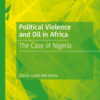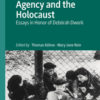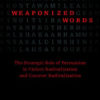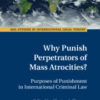Books

Political Violence and Oil in Africa: The Case of Nigeria
By Zainab Ladan Mai-Bornu. The book argues that in order to better understand the undercurrents of the Niger Delta conflict, it is imperative to analyse the dynamics of choice in terms of the distinct courses of action taken by the Ogoni and Ijaw. Given the similar structural constraints, the author considers why the Ogoni adopted…
Read more
The Moral Triangle: Germans, Israelis, Palestinians
By Sa′ed Atshan and Katharina Galor. In The Moral Triangle Sa’ed Atshan and Katharina Galor draw on ethnographic fieldwork and interviews with Israelis, Palestinians, and Germans in Berlin to explore these asymmetric relationships in the context of official German policies, public discourse, and the private sphere. They show how these relationships stem from narratives surrounding moral responsibility,…
Read more
On Inhumanity: Dehumanization and How to Resist It
By David Livingstone Smith. The Rwandan genocide, the Holocaust, the lynching of African Americans, the colonial slave trade: these are horrific episodes of mass violence spawned from racism and hatred. We like to think that we could never see such evils again—that we would stand up and fight. But something deep in the human psyche—deeper…
Read more
Brain Science under the Swastika: Ethical Violations, Resistance, and Victimization of Neuroscientists in Nazi Europe
By Lawrence A. Zeidman. Brain Science under the Swastika draws connections between neuroscience, patient sterilization and murder, the Holocaust, and neurological experiments and research, so that readers will be able to see the central role of neuroscience under the Nazis in a never-before presented fashion; connections and networks between killers and scientists will be illustrated….
Read more
Agency and the Holocaust: Essays in Honor of Debórah Dwork
Edited by Thomas Kühne and Mary Janes Rein. The book assembles case studies on the human dimension of the Holocaust as illuminated in the academic work of preeminent Holocaust scholar Deborah Dwork, the founding director of the Strassler Center for Holocaust and Genocide Studies, home of the first doctoral program focusing solely on the Holocaust…
Read more
Weaponized Words: The Strategic Role of Persuasion in Violent Radicalization and Counter-Radicalization
By Kurt Braddock. Weaponized Words applies existing theories of persuasion to domains unique to this digital era, such as social media, YouTube, websites, and message boards to name but a few. Terrorists deploy a range of communication methods and harness reliable communication theories to create strategic messages that persuade peaceful individuals to join their groups…
Read more
Embattled Dreamlands: The Politics of Contesting Armenian, Kurdish and Turkish Memory
By David Leupold. Embattled Dreamlands explores the complex relationship between competing national myths, imagined boundaries and local memories in the threefold-contested geography referred to as Eastern Turkey, Western Armenia or Northern Kurdistan. Spatially rooted in the shatter zone of the post-Ottoman and post-Soviet space, it sheds light on the multi-layered memory landscape of the Lake Van…
Read more
Why Punish Perpetrators of Mass Atrocities? Purposes of Punishment in International Criminal Law
Edited by Florian Jeßberger and Julia Geneuss. This edited volume provides, for the first time, a comprehensive account of theoretical approaches to international punishment. Its main objective is to contribute to the development of a consistent and robust theory of international criminal punishment. For this purpose, the authors – renowned scholars in the fields of criminal…
Read more
Aftermath of the Holocaust and Genocides
Edited by Victoria Khiterer and Erin Magee. This book illuminates unknown aspects of the aftermath of the Holocaust and genocides, and discusses trials of Holocaust and genocide perpetrators, commemoration of the victims, attempts to revive Jewish national life, and outbreaks of post-World War II anti-Semitism. It also analyzes the representation of the Holocaust and genocides…
Read more
Sharing the Burden of Stories from the Tutsi Genocide
By Anna-Marie de Beer. This book deals with literary representations of the genocide against the Tutsi in Rwanda. Its focus is a transnational, polyphonic writing project entitled Rwanda: écrire par devoir de mémoire (Rwanda: Writing by Duty of Memory), undertaken in 1998 by a group of nine African authors. Anna-Marie de Beer’s study emphasizes the Afropolitan cultural…
Read more
